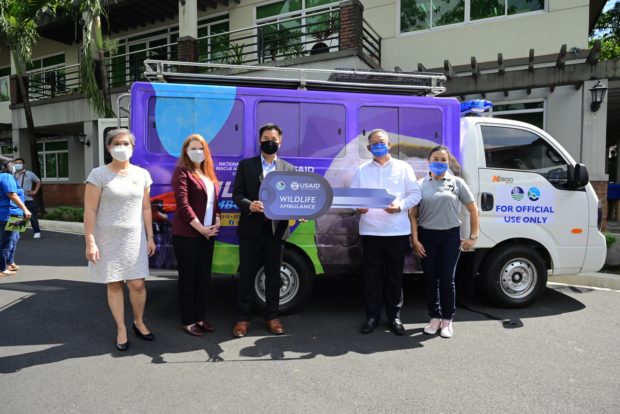
USAID turns over a new wildlife ambulance to officials of the Department of Environment and Natural Resources. (Photo from US embassy)
MANILA, Philippines — The United States Agency for International Development (USAID) turned over a new wildlife ambulance to the Department of Environment and Natural Resources (DENR) to “strengthen the Philippine government’s wildlife rescue and rehabilitation efforts.”
The ambulance which is part of USAID’s P1.2 billion Protect Wildlife Project will help improve the time response of DENR National Wildlife Rescue and Research Center wildlife rescue and retrieval and immediate on-site care for injured and trafficked wildlife, the US embassy to the Philippines said in a statement on Friday.
The turnover was made on March 2.
WILDBase, a centralized online system for recording and monitoring rescued wildlife, was also handed over by the USAID.
According to the US embassy, WILDBase will help rescue centers to “keep track of wildlife in their care, as well as medical records, inventory, and other important information for rescue center operations and decision-making.”
DENR Undersecretary Ernesto Adobo, Jr. received the wildlife ambulance and WILDBase from USAID Philippines Environment Office Deputy Director Paul Seong in a turnover ceremony held at the Ninoy Aquino Parks and Wildlife Center.
“We appreciate USAID’s continued generosity to the DENR through the years. The enforcement of our wildlife laws, rules, and regulations do not end with the confiscation of the wildlife and the prosecution of the violators,” said Adobo.
“With this new ambulance, WILDBase, and newest equipment and materials, we can more easily treat and monitor the health of confiscated wildlife,” he added.
READ: Giant clam shells worth $3.3 million seized in Palawan raid
Seong also said that “this ambulance and online system complete USAID’s program of assistance for the DENR’s National Wildlife Rescue and Research Center, and complements the Center’s new wildlife diagnostics equipment, wildlife handling tools, and digital innovations.”
Since 2016, the project has helped protect 750,000 hectares of diverse landscapes and seascapes, according to the US embassy.
It also brought economic and environmental benefits to 95,000 Filipinos and has trained 2,300 men and women in improving environmental enforcement practices. — Liezelle Soriano Roy, trainee